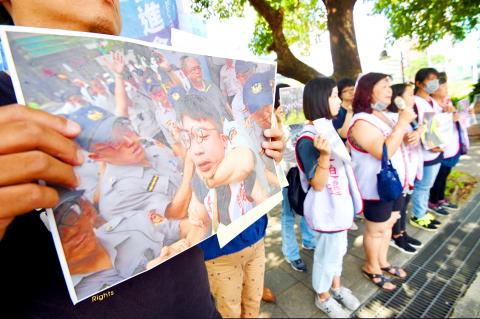A coalition of groups opposed to forced evictions yesterday rallied outside the Control Yuan to call for an investigation into two demonstrations at which protesters were allegedly beaten up and confined to designated areas by police.
At demonstrations on Thursday and Friday by residents of New Taipei City’s Daguan (大觀) community, police abused their power by taking unnecessarily violent measures and restricting protesters’ freedom, Taiwan Association for Human Rights policy director Shih Yi-hsiang (施逸翔) said.
During Thursday’s demonstration outside the National Housing and Regeneration Center in Taipei, where President Tsai Ing-wen (蔡英文) attended a ceremony, protesters were violently dragged 200m to an area bordered by barricades and police officers after being told once to disperse, the protesters’ letter to the Control Yuan said.

Photo: Peter Lo, Taipei Times
They were forced to stay in the barricaded area, which the police described as a “protest zone,” and prevented from going to the restroom for two hours, the letter said.
Several who tried to leave were slapped in the face, pushed to the ground or kicked in the stomach by police guarding the area, it said.
The police also prevented them from drinking water, said Lin Yen-yu (林燕玉), a Daguan resident who took part in the protest.
“We would not be protesting on the street if we did not need to. We are only doing it because the government is evicting us from our homes,” she said. “The government is making life so difficult for us.”
Daguan residents are facing forced eviction after losing an extended legal battle with the Veterans Affairs Council over land rights in 2014.
During Saturday’s protest, held outside New Taipei City’s Jiangcui Elementary School two hours before a Democratic Progressive Party campaign event featuring Tsai was to begin, protesters were dragged away, put in police cars and prevented from leaving, the letter said.
Emily Chen, 10, said that police ignored requests to let her go to a restroom and to turn down the car’s air conditioner, despite her being wet from the rain and feeling cold.
According to Article 3 of the Police Power Exercise Act (警察職權行使法), police should exercise their power only to the extent necessary, the association’s legal specialist Wang Si (王曦) said.
By restricting protesters’ freedom without a proper reason, the police violated the act, as well as the International Covenant on Civil and Political Rights and the International Covenant on Economic, Social and Cultural Rights, Wang said.
To prevent police from abusing their powers and to better protect the public’s right to demonstrate and rally, the Control Yuan should investigate the two cases, Shih said.
“If no individual officers are identified, then their supervisor should be held responsible, whether they are head of a police department or the National Police Agency — or the minister of the interior,” Shih added.

The brilliant blue waters, thick foliage and bucolic atmosphere on this seemingly idyllic archipelago deep in the Pacific Ocean belie the key role it now plays in a titanic geopolitical struggle. Palau is again on the front line as China, and the US and its allies prepare their forces in an intensifying contest for control over the Asia-Pacific region. The democratic nation of just 17,000 people hosts US-controlled airstrips and soon-to-be-completed radar installations that the US military describes as “critical” to monitoring vast swathes of water and airspace. It is also a key piece of the second island chain, a string of

A magnitude 5.9 earthquake that struck about 33km off the coast of Hualien City was the "main shock" in a series of quakes in the area, with aftershocks expected over the next three days, the Central Weather Administration (CWA) said yesterday. Prior to the magnitude 5.9 quake shaking most of Taiwan at 6:53pm yesterday, six other earthquakes stronger than a magnitude of 4, starting with a magnitude 5.5 quake at 6:09pm, occurred in the area. CWA Seismological Center Director Wu Chien-fu (吳健富) confirmed that the quakes were all part of the same series and that the magnitude 5.5 temblor was

Taiwan will now have four additional national holidays after the Legislative Yuan passed an amendment today, which also made Labor Day a national holiday for all sectors. The Chinese Nationalist Party (KMT) and Taiwan People’s Party (TPP) used their majority in the Legislative Yuan to pass the amendment to the Act on Implementing Memorial Days and State Holidays (紀念日及節日實施辦法), which the parties jointly proposed, in its third and final reading today. The legislature passed the bill to amend the act, which is currently enforced administratively, raising it to the legal level. The new legislation recognizes Confucius’ birthday on Sept. 28, the

The Central Weather Administration has issued a heat alert for southeastern Taiwan, warning of temperatures as high as 36°C today, while alerting some coastal areas of strong winds later in the day. Kaohsiung’s Neimen District (內門) and Pingtung County’s Neipu Township (內埔) are under an orange heat alert, which warns of temperatures as high as 36°C for three consecutive days, the CWA said, citing southwest winds. The heat would also extend to Tainan’s Nansi (楠西) and Yujing (玉井) districts, as well as Pingtung’s Gaoshu (高樹), Yanpu (鹽埔) and Majia (瑪家) townships, it said, forecasting highs of up to 36°C in those areas